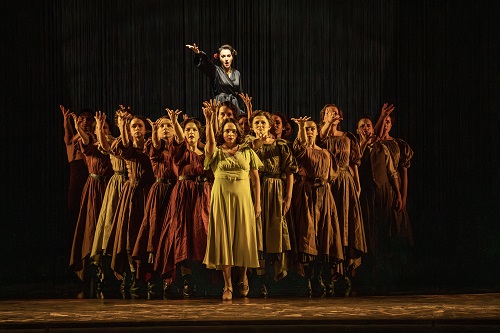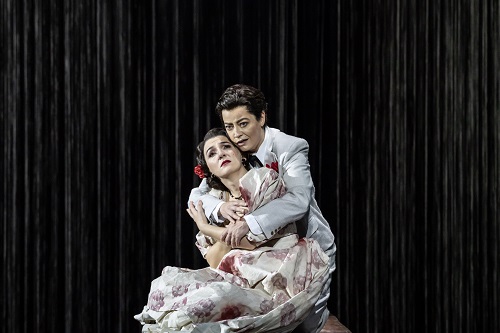Spain is ‘a country of death, a country open to death’ once declared the poet and playwright Federico García Lorca. It’s an assertion that provides a foretaste of Ainadamar, Osvaldo Golijov’s 80-minute single act opera which premiered in 2003. Reworked two years later and now presented by Welsh National Opera as a co-production with Opera Ventures, Scottish Opera, Detroit Opera and the Metropolitan Opera, Ainadamar is essentially a staged elegy exploring the brief life of Lorca, a champion of Spanish Republicans, executed by fascist Falangists near the beginning of the Spanish civil war in 1936 . It’s told through the memories of his Catalan actress muse Margarita Xirgu (1888-1969) who created the role of Mariana Pineda, Lorca’s first successful play (originally costumed by Salvador Dalí) about a historical figure martyred in 1831 for her scheming against the reigning monarch Ferdinand VII. The work’s plea for freedom was an inspiration for Lorca and, by extension, the Argentinian composer Golijov.
Ainadamar, meaning ‘fountain of tears’ and referring to the mountain spring north of Granada where the playwright was shot, is not exactly a portrait opera in the manner of Philip Glass’s Akhnaten, nor quite a passion play. It’s more a poetic meditation, variously dreamlike, wistful and punctuated by pulsing flamenco rhythms and much stunning dance movement courtesy of Brazilian director Deborah Colker and dance choreographer Antonio Najarro. Both the music’s patchwork of styles and striking visuals add considerable impact to an opera that occasionally feels inert, its loosely connected vignettes in need of dramatic impetus. Its central figure is brought to life in a series of flashbacks sewn together by David Henry Hwang’s libretto, originally set in English and then translated into Spanish by the composer.

The fragmented ‘plot’ and abrupt time shifts centre around Xirgu’s reminiscences to her pupil Nuria relating to her past performances as Mariana Pineda and her abortive pleas to Lorca to abandon Spain and flee with her to Uruguay. His refusal and her guilt for his fate, interrupted periodically by sounds of dripping water and horses’ hooves and a succession of slogans and ominous radio announcements, culminate in a vision of the playwright’s brutal assassination darkly suggested by designer Jon Bausor. His staging is dominated by a cylindrical curtain of translucent threads, a fluid ‘fountain of tears’ onto which Tal Rosner’s evocative images of ghostly bulls and fascist mantras are projected, the whole soberly lit by Paul Keogan. Tables are resourcefully converted into barricades, additional percussion instruments and, hauntingly, repurposed as a revolving cross for a triple execution, evoking Christ’s Crucifixion.
Musically, there is much to admire in Golijov’s flamenco-saturated score, an intoxicating mélange of traditional Spanish cante jondo, scraps of klezmer, Latin American and electronic sampling. But however distinctive the set pieces are, whether bittersweet, flamboyant or sultry, they feel like a series of stylistic juxtapositions, independent of one another. There’s no denying the rhythmic energy, nor the skill in Golijov’s orchestration (including flamenco guitars and a box-drum cajón), which includes a memorable confessional scene where shape shifting harmonies are coloured by strings and tuned percussion with mesmeric effect. Under the baton of Matthew Kofi Waldren, the WNO orchestra handsomely delivered the composer’s score in playing that was rhythmically alert and seductive.

There was plenty of allure on stage from the flamenco dancers, the superb WNO chorus and three principals of whom the soprano Jaquelina Livieri as Xirgu fully inhabited her determination to keep alive the memory of Lorca, passion and regret given powerful expression in rhapsodic singing. Her protégé Nuria was persuasively sung by Colombian mezzo Julieth Lozano Rolong (reprising the role she had in the Scottish Opera production in 2022), and no less convincing was a besuited Hannah Hipp in the trouser role of Lorca. And what an interesting voice hers is! Part tenor, part contralto, a timbral differentiation that enhanced her androgynous presence and adding a sense of dislocation from any worldly reality. Elsewhere, Alfredo Tejada as the falangist Ruiz Alonso and Jasey Hall, the guard José Tripaldi, made important cameo contributions.
Overall, a visually and musically arresting evening if dramatically uneven, sometimes cryptic, but presented with striking imagination and verve. Another impressive achievement for WNO.
David Truslove
Margarita Xirgu – Jaquelina Livieri, Federico Garica Lorca – Hannah Hipp, Nuria – Julieth Lozano Rolong, Ruiz Alonso – Alfredo Tejada, José Tripaldi – Jasey Hall, Torero – Gareth Dafydd Morris, Maestro – Alun Rhys-Jenkins, Director – Deborah Colker, Designer – Jon Bausor, Lighting Designer – Paul Keogan, Projection Designer – Tal Rosner, Flamenco Choreographer – Antonio Najarro, Sound Designer – Cameron Crosby, Conductor – Matthew Kofi Waldren & WNO Chorus and Orchestra.
The Mayflower, Southampton; Wednesday 22nd November 2023.
ABOVE: Hanna Hipp as Federico García Lorca and Ensemble (c) Johan Persson